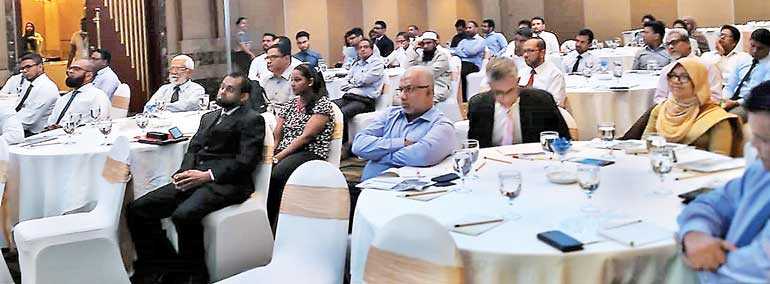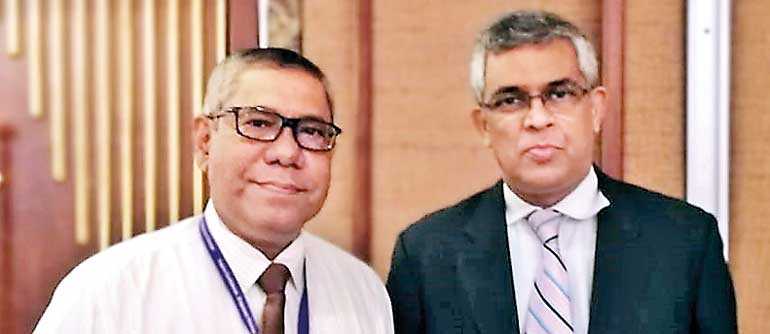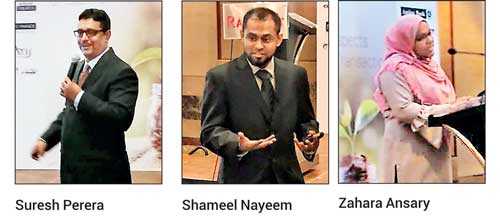Tuesday Feb 24, 2026
Tuesday Feb 24, 2026
Tuesday, 5 March 2019 00:43 - - {{hitsCtrl.values.hits}}

A section of the audience

Reyaz Mihular and Ravi Abeysuriya
The Association of Alternate Financial Institutions (AAFI) in collaboration with The Chartered Institute of Management Accountants (CIMA) Sri Lanka conducted an educative and interactive workshop on the Tax and Accounting Aspects of Islamic Finance transactions on 26 February at the Ramada Hotel, Colombo.
The welcome address was delivered by AAFI President Ravi Abeysuriya, FCMA, CGMA. During his address, Abeysuriya praised the partnership between AAFI and CIMA stating, “We feel that this collaboration will help AAFI members and CIMA members alike in understanding the concept of Alternate Finance and its contribution to the economy.” He further added, “Sukuk is one of the most significant developments in the global capital markets. Many countries have successfully used Sukuk for mega infrastructure projects. We see many countries such as the UK, France, Singapore, Hong Kong and Ireland who have taken steps to create an environment conducive to Islamic/Alternate Finance since this will pave ways for attracting large investments. Sri Lanka is in need for large foreign direct investments and we should look at these avenues to be a preferred destination for investments.” 
Abeysuriya also acknowledged the presence of the members of the AAFI Advisory committee including KPMG Managing Partner Reyaz Mihular, Advisor A.I. Marikar, Commercial Leasing Company Ltd. CEO Krishan Thilakaratne and Amana Bank PLC CEO Mohammed Azmeer. The members of the Association including Amana Bank PLC, Amana Takaful PLC, Commercial Bank PLC, Commercial Leasing and Finance PLC, LOLC Finance – Al Falaah, LOLC General Insurance Al-Falaah Takaful, Peoples Leasing and Finance PLC and Richard Pieris Finance Ltd. came on board as sponsors for the event.
CIMA Sri Lanka Country Manager Zahara Ansary, ACMA, CGMA addressed those present and mentioned that CIMA is celebrating 100 years in 2019 and that it is exciting to be a part of new ventures. “Last Wednesday we signed a Memorandum of Understanding with AAFI. This partnership is of mutual benefit as there are many CIMA students and members working in this industry and disseminating the latest developments on the statutory and regulatory changes to them in a comprehensive manner is important. Collaborations of this sort help not just our members but the industry at large too, which ties in well with our vision – to power trust, opportunity and prosperity.”
She also spoke of the new Future of Finance Research ‘Re-inventing finance for a digital world’ completed by CIMA and requested those who wanted more details to be in touch with the local division to attend sessions conducted on the research findings.
A.I. Marikar, a veteran of the Islamic Finance industry in Sri Lanka also shared his thoughts on the industry. In his speech he urged financial institutions to step away from the norm to partake in seldom offered products including Salam and Tawarruq. He also stressed the importance of Sukuk as a means of attracting foreign investment and advocated for institutions to facilitate the implementation of Sukuks to feed Sri Lanka’s need for large foreign direct investments.
Technical presentations were delivered by KPMG Sri Lanka Principal – Tax and Regulatory Suresh Perera, FCMA, CGMA, who illustrated the complex tax implications of Islamic Finance products and KPMG Sri Lanka Partner – Accounting Advisory Shameel Nayeem, who explained on the multifaceted Accounting treatment that could be applied when accounting for income and expenses in relation to Islamic Finance products. Perera mentioned that the exemption for interest on housing loans available under the old Inland Revenue Act had been revoked under the new Act. He also mentioned that the Withholding Tax circular issued by the Department of Inland Revenue, specifically mentioned that receipts from Islamic Finance Transactions would be subject to withholding at the rate of 5%.
During his presentation, Shameel Nayeem, using Bahrain and Malaysia as an example, mentioned that different rules and methodologies in accounting for Islamic Finance products are followed by different counties. A common theme of both presentations was that industry players, accounting bodies as well as the AAFI must join hands to address the lacunas in the law in relation to Islamic Finance transactions.